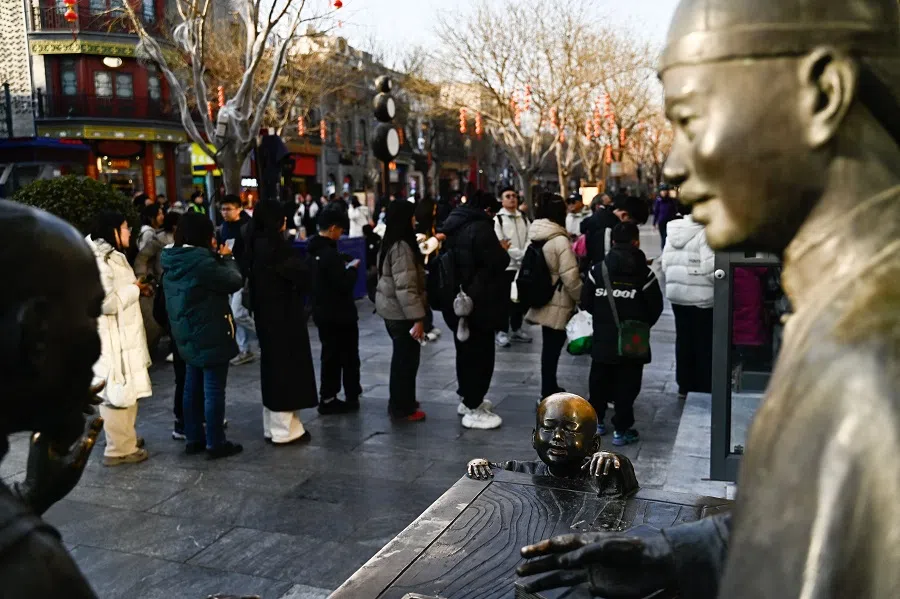A shared humiliation? How the Chinese see themselves in Ukraine
US academic Wu Guo examines how constructivism might help the Chinese transcend the “century of shame” narrative, reshaping perceptions of national strength and diplomacy for a more balanced understanding of history and global engagement.

I believe that many Chinese and overseas Chinese scholars of international relations are particularly inclined towards the realist school of thought that emphasises an anarchic power competition among states based on self-interest and self-preservation. However, modern critics argue that this overlooks cultural factors and the potential for international cooperation.
Although the realist school still holds significant influence, researchers and observers should also consider another more contemporary school of thought in international relations — constructivism.
No objective absolutes
Constructivism provides a fresh perspective that transcends material factors, emphasising social relations, perceptions and identity. It challenges the traditional paradigms of realism and liberalism by arguing that a state’s behavior is not solely determined by material power (such as military strength and economic capability) but is also influenced by perceptions, identity and mutual understanding.
It is important to note that akin to a post-modern “cultural turn”, constructivism generally aligns with the contemporary trend for the English-speaking academic world across the various social sciences such as history or anthropology. This trend challenges the notion that any phenomenon or idea is an absolute and unchanging political fact.
Instead, it highlights the importance of perspectives, understanding, identity, viewpoints and shared memory. This approach, inspired by Foucault’s archaeology of knowledge, aims to gradually place any model or concept within its historical context, allowing for a deeper understanding and deconstruction.
While every country’s need to survive goes without saying, there is no absolute answer whether offence or defence is the best way to defend national security interests...

The constructivist perspective stresses that everything is an artificial construction, which is a dynamic process without inherent and objective absolutes or sanctity. This approach also posits that any institution, such as slavery, is a product of specific ideas and can be revised or even abolished as those ideas evolve.
What factors impact decisions and actions?
From a constructivist perspective, concepts from the realist school such as offensive realism and defensive realism are seen as gradually constructed cognitive models or theoretical distillation of established facts. While every country’s need to survive goes without saying, there is no absolute answer whether offence or defence is the best way to defend national security interests: the decisionmaker’s values, subjective cognitive frameworks, and even emotions and personalities determine what concrete actions take.
For example, one perspective is that Russia should have taken preemptive measures to ensure its security in response to Ukraine’s desire to join NATO. Alternatively, another view is that Russia should have first respected Ukraine’s territorial and sovereign integrity, as outlined in the 1994 Budapest Memorandum, where countries, including Russia, pledged to respect Ukraine’s sovereignty, independence and territorial integrity in exchange for Ukraine giving up its nuclear weapons. Ultimately, this matter hinges on the personal judgment of leaders and the historical relationships between the parties involved.
The Chinese view of modern history: ‘century of shame’
Similarly, the belief that China’s national rejuvenation is justified and should be respected due to the “century of shame” since the Opium Wars, and that China’s military strategic culture is generally defensive, is a matter of cognition. Meanwhile, the perception held by some Western scholars and politicians that China harbours ambitions of global domination is also a matter of cognition.
This leads the Chinese to generally accept that national strength is the foundation of diplomacy, and that a weak country is destined to fail in its diplomatic efforts.
From a nationalist historical view of China, the century of shame can be seen as a mainstream historical narrative and memory shared by Chinese people on both sides of the Taiwan Strait. This narrative emphasises how modern China, as a weaker nation, rose up against the continuous humiliation as well as the coercion and bullying of imperialist diplomacy and wars of aggression.

More crucially, this collective memory and construction of knowledge through historical records and textbooks have led to the widely accepted belief that “weak countries have no diplomacy”. This leads the Chinese to generally accept that national strength is the foundation of diplomacy, and that a weak country is destined to fail in its diplomatic efforts.
Other ways of looking at history
This discourse is undoubtedly supported by a wealth of facts and evidence, but in the face of more detailed and stringent empirical research, it might not necessarily hold up. Recent historical research in the Chinese-speaking world, including earlier studies with a different approach, such as T.F. Tsiang’s Outline of Modern Chinese History published in 1938, reveals that the Qing government itself had numerous missteps and cognitive limitations in handling diplomacy that were not entirely attributable to issues of strength and weakness, but more about insufficient modernisation.
Academic research also showed that throughout the Republican period spanning the Peking government from 1912 to 1927 and the Nanjing government from 1928 to 1949, Chinese diplomats, such as the patriotic and highly professional V.K. Wellington Koo and T.V. Soong, upheld national dignity and reclaimed the rights lost during the late Qing dynasty, such as tariff autonomy, and secured reasonable compensations from countries like Germany.
Such a novel perspective encourages the Chinese to moderately distance themselves from overly emotional and propagandised perceptions of “national humiliation” and notions that “weak countries have no diplomacy”, while also garnering respect for the professionalism in diplomatic work. They would understand that although not every diplomatic negotiation and effort is immediately reported by the media, included in textbooks, or even disclosed in its entirety, these efforts have always been ongoing.
It is easy here for the Chinese to form an emotional “identification” with Ukraine in a constructivist sense, just as how China, carved up by imperialist powers during the late Qing dynasty, strongly empathised with weak Eastern European countries like Poland.
Chinese people’s empathy for Ukraine
The shocking public altercation between Ukraine President Volodymyr Zelenskyy and US President Donald Trump as well as Vice-President JD Vance at the White House reignited nationalist sentiments in the Chinese audience, who have deeply internalised the consciousness of the century of shame.
Clearly disadvantaged by not being a native English speaker, Zelenskyy was verbally bombarded by two American leaders whose native language is English, including Vance’s use of his index finger while speaking (considered extremely hostile and gruff in Anglo-American culture). This awakened the Chinese people’s empathy as a nation that experienced humiliation, and once more reinforcing the already questionable notion of “weak countries have no diplomacy”.
It is easy here for the Chinese to form an emotional “identification” with Ukraine in a constructivist sense, just as how China, carved up by imperialist powers during the late Qing dynasty, strongly empathised with weak Eastern European countries like Poland.

I want to reiterate that from a constructivist perspective, the memory of the century of shame and the call to “never forget national humiliation” are both part of a cognitive system and the process of discourse construction. This construction is increasingly challenged by more empirical and rigorous academic research, which is abundant in English, gradually restoring the public’s historical knowledge to a rational and balanced state rather than being driven by traumatic memories and the desire for vengeance.
Unfortunately, Trump and Vance provided a perfect example that even in this decade of the 21st century, the legitimate leader of a small and weak country can still be publicly humiliated and reprimanded — even expelled from the host’s territory. American scholars studying modern Chinese nationalism and the cognitive construction of foreign relations might indeed reflect in future research on where exactly China’s nationalism originates.
This article was first published in Lianhe Zaobao as “国际关系中的建构主义与现代中国民族主义”. (Updated version 12 March 2025)





